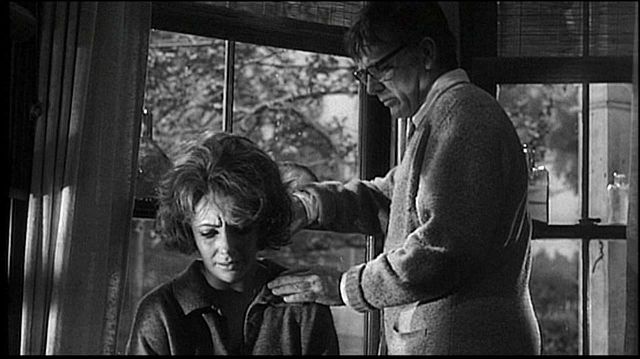Who’s Afraid of Virginia Woolf? (1966) 
“You are cordially invited to George and Martha’s for an evening of fun and games.”

Director: Mike Nichols
Cast: Elizabeth Taylor, Richard Burton, George Segal
Synopsis: A bitter aging couple with the help of alcohol, use a young couple to fuel anguish and emotional pain towards each other.
‘You are cordially invited to George and Martha’s for an evening of fun and games,’ announced the tagline for Who’s Afraid of Virginia Woolf, Mike Nichols’ directorial debut, and the irony of its polite understatement is typical of the illusions which pervade Ernest Lehman’s caustic script, which is adapted from the stage play by Edward Albee. The enigmatic title, repeatedly referred to throughout the movie, is acknowledged by Albee to mean ‘who’s afraid of the big bad wolf,’ where the wolf is life without false illusions, and the lives of Martha and George, the daughter of the President of a New England college and her husband, an associate professor of history at the college, are tissues of truth and lies which, most of the time, are indistinguishable to the audience. They share a turbulent, emotionally bruising, relationship built upon vicious games of psychological one-upmanship and a telling illusion which provides its last meaningful strand.
The couple, played by Richard Burton and Elizabeth Taylor, return home at two in the morning from a college function at which they have both imbibed more than is wise. The friction within their relationship is immediately apparent as Martha doggedly hassles George to recall the title of a Bette Davis movie in which she said the line ‘what a dump.’ George is ready for bed, but Martha reveals that she’s invited the college’s new young biology professor and his wife over for drinks. When handsome Nick (George Segal) and his mousy wife Honey (Sandy Dennis) arrive, Martha and George are already in full flow, and the thin veneer of social niceties quickly breaks apart as the older couple play a series of increasingly brutal psychological games. Initially disturbed by George and Martha’s behaviour, Nick and Honey slowly find themselves becoming inexorably drawn into the poisonous exchanges, and their own relationship then comes under scrutiny.
For much of the movie, the key theme of childbirth is only obliquely referred to, but it increasingly takes centre stage as the night goes on. Martha and George have a son, a sixteen-year-old boy who is never named. Or do they? Is their son a truth or a lie? Either way, it’s clear that they both share a huge fondness for their son, and that he is the only thing that binds them together in the kind of relationship that most people would find impossible to bear. But as George and Martha’s verbal battles continue we begin to gain an insight into just why they are each the way they are, and why they both drink so much — she’s sexually frustrated and he is impotent. Nick and Honey, an apparently happily married young couple, are pretty much George and Martha as they used to be, and the suggestion is that the flaws and emotional frailties that now torment the older couple, are already there, unseen and unacknowledged, in the younger couple’s relationship.
Who’s Afraid of Virginia Woolf, in which there are only four main characters, relies heavily on the quality of its performances, and while there was probably no doubt that Richard Burton was up to the job, there was a considerable amount of doubt about Taylor’s acting ability (Albee actually had the much older Bette Davis and James Mason in mind for the parts). However, she gives by far the best performance of her career as the blowsy, shrewish Martha, and you kind of wonder why she was such an ordinary — if not downright poor — actress in most everything else she appeared in. Segal and Dennis have less showy roles, but each holds up their own in the face of Burton and Taylor’s blistering performances. The film is shot in black-and-white, and it’s a wise decision given the dark nature of the material. Haskell Wexler’s sharp, unflinching cinematography gets in close to the protagonists, allowing us to see every unsightly blemish and scar, and the positioning of the characters within the frame cleverly provides vital clues to the positions within the power struggle at any given time.
Who’s Afraid of Virginia Woolf isn’t an easy movie to watch, and provides a disturbingly realistic analysis of the frailty of human emotions and the ways in which such insecurities can cause us to lash out, not only at those closest to us, but at the world in general. It’s definitely a movie which rewards repeated viewings, and from which an incomplete understanding will be drawn after an initial viewing.
(Reviewed 1st August 2012)
httpv://www.youtube.com/watch?v=DW2Loh5a3JI
